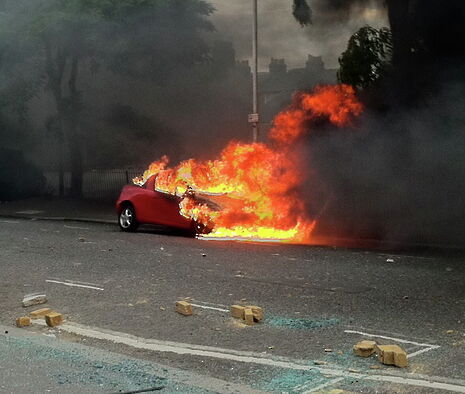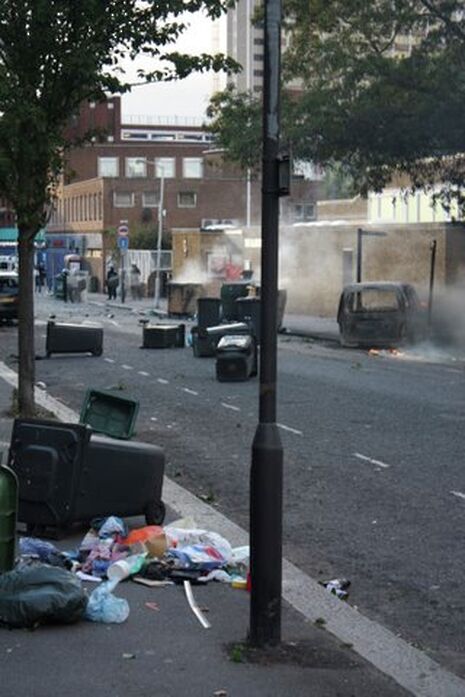‘It’s not a North African revolution, but it’s getting there’
Varsity correspondent Tom Belger reported from Lewisham, south-east London on Tuesday, following the riots that later spread thoughout the country
Primark, Tesco, TK Maxx, Marks & Spencers; metal shutters have come down over all of their doors. Mcdonald’s shattered windows lie hidden behind hastily erected wooden boards. The pavement leading up one side-street is strewn with ashes, the faces of parking meters scorched beyond recognition. Police congregate in threes at the end of every road. Lewisham’s normally bustling market-centre is almost a ghost town, with not a single stall in sight.

Two nights ago the area’s disenchanted youth took to the streets, echoing their counterparts across London and beyond. I looked on with a friend about twenty metres away from a line of riot police blocking entry to the centre of town, where – we found out later - violent clashes were taking place. A crowd of hooded youths stood on a grassy mound to our right. Every twenty minutes or so, a small group of masked men from among their number would form clusters to cloak one of them from view. Then the hidden figure would hurl several rocks at the police, who did no more than duck and then move back into line.
I approached the police cautiously, but they were quite happy to talk up close. When I asked what was going on in the centre of town, however, they proved as clueless as the barking Alsatians at their feet.
I got a much cooler response from some of the boys with their hoods up around me. A couple immediately backed away at words like ‘video’ and ‘newspaper’. Another on the mound launched into a tirade of expletives at my presumptuous behaviour, demanding I back away.
‘Them bad, man. There’s no reason to kill the local youth’, one snarled at the camera, his face entirely masked bar a slit for his eyes.
‘Definitely on the cusp,’ one local thought. A few further stones were thrown, but there was to be little further action where we were. The crowd on the mound began to dissipate, ordinary officers replaced the riot team and the sirens faded out as their vans sped off into the distance.
It was only the following afternoon that I found out what had been happening in the centre of town. Protests had begun outside the town hall, and then descended into vandalism and violence. A row of cars had been burnt out down a backstreet, in images relayed across the national press. Riot squads had been caught in a long stand off on the street with a group more violent than the one I’d seen on the mound.

A local resident said the conflict had started there when a crowd of youths pulled up in cars a few roads away, donned balaclavas and began to descend upon the centre of town. Few were over eighteen, he said. Several were girls. Blocked by the police, they proceeded to throw whatever they could find at them and set cars ablaze. The wall of a front garden was torn down for its bricks. One burning car had its handbrake torn out and was pushed towards the police, who were saved less by their own efforts than by the rioters’ inability to steer it.
Anger at the police is no longer limited to the perpetrators. The local resident I spoke to, a man in his late 20s, said he’d attempted to cycle away, and been pushed off his bike by the youths. As he lay on the floor and flames and smoke enveloped his neighbours’ cars, the police stood still a hundred metres away. He condemned their handling of the situation, calling it ‘out of control’. It was a girl from among the rioters who eventually helped him to his feet.
Jordan, a teenage boy who’d been involved in the stand off the night before, defended his actions and the looting carried out by others. He drew a line under burning cars and buildings, however, as he said he wished no harm on local shopkeepers. He claimed he was venting his anger at the police, who had stopped and searched him in the borough every day for the past week.
‘Don’t believe a word they say’, I was told by a policeman who had overheard our conversation. I saw his colleague dropping a dislodged paving slab into the river that runs through town, and asked what he was doing. ‘So the yobs can’t use it,’ he replied grimly.
‘They’re not protecting us, they’re killing us’, said Ma’ankha, a young woman standing outside the police station. She was waiting for the release of her nephew, who’d been arrested the night before. Her fury was breathtaking. She said parents should ‘take this police station down and every other one they come across, every government building they come across, and burn them down…you’ve got to hit the man where it hurts’. She sent me a text later that read: ‘F*CK THE POLICE! I AM NOT AFRAID, I WALK WITH THE MOST HIGH REVOLUTION!’

‘It’s nowhere near the north African revolution, but it’s going to get there’, her elder sister Fiona chimed in with similar passion. ‘The bottom line is that we’ve had enough. Had enough of corrupt police, corrupt governments, and corrupt institutions,’ she raged, as though addressing a rally. ‘The time has come to stand up’.
Not if the aspiring politicians of Cambridge have anything to do with it. Edward Turnham, Chair-elect of Cambridge University Conservative Association, slammed in the strongest of terms the ‘mindless destruction’ committed by a ‘feral underclass’ seeking to ‘gratify their bestial and selfish urges’. Richard Johnson, Chair of CULC, was equally critical of the rioters’ ‘deplorable’ behaviour. He claimed also there was ‘a lot that the government could be blamed for’, including what he deemed its ‘slow and inadequate response’, ‘destruction of a sense of community’ and ‘failure to defeat poverty’.
As I walked off, I caught sight of helmeted policemen mounting horses behind the station’s locked gates. Even their horses had been given visors. North African revolution this is not, but the scale of discontent – and the gravity with which the police are responding to it - is clear. It seems naïve to imagine the destruction Lewisham has seen in the past few days will be the last.
 News / SU reluctantly registers controversial women’s soc18 December 2025
News / SU reluctantly registers controversial women’s soc18 December 2025 Features / Should I stay or should I go? Cambridge students and alumni reflect on how their memories stay with them15 December 2025
Features / Should I stay or should I go? Cambridge students and alumni reflect on how their memories stay with them15 December 2025 News / Dons warn PM about Vet School closure16 December 2025
News / Dons warn PM about Vet School closure16 December 2025 News / Cambridge study finds students learn better with notes than AI13 December 2025
News / Cambridge study finds students learn better with notes than AI13 December 2025 News / Uni registers controversial new women’s society28 November 2025
News / Uni registers controversial new women’s society28 November 2025









